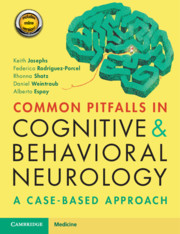Book contents
- Common Pitfalls in Cognitive and Behavioral Neurology
- Common Pitfalls in Cognitive and Behavioral Neurology
- Copyright page
- Dedication
- Contents
- Diseases Discussed in the Book
- Preface
- Acknowledgements
- Abbreviations
- Part 1 Missing the Diagnosis Altogether
- Part 2 Misidentifying the Impaired Cognitive Domain
- Case 6 “The Thing about Remembering Names of Things”
- Case 7 Remembering That We Forget versus Forgetting Altogether
- Case 8 “This Is Not Like Him”
- Case 9 “She Just Does Not Want to Do Things”
- Case 10 Looking without Seeing
- Part 3 Missing Important Clues in the History
- Part 4 Failure of Pattern Recognition
- Part 5 Difficult-to-Characterize Cognitive/Behavioral Disorders
- Part 6 Clinical Findings That Are Subtle
- Part 7 Misinterpreting Test Results
- Part 8 Attributing Findings to a Known or Suspected Disorder
- Part 9 Missing Radiographic Clues
- Part 10 Management Misadventures
- Index
- Plate Section (PDF Only)
- References
Case 7 - Remembering That We Forget versus Forgetting Altogether
from Part 2 - Misidentifying the Impaired Cognitive Domain
Published online by Cambridge University Press: 03 November 2020
- Common Pitfalls in Cognitive and Behavioral Neurology
- Common Pitfalls in Cognitive and Behavioral Neurology
- Copyright page
- Dedication
- Contents
- Diseases Discussed in the Book
- Preface
- Acknowledgements
- Abbreviations
- Part 1 Missing the Diagnosis Altogether
- Part 2 Misidentifying the Impaired Cognitive Domain
- Case 6 “The Thing about Remembering Names of Things”
- Case 7 Remembering That We Forget versus Forgetting Altogether
- Case 8 “This Is Not Like Him”
- Case 9 “She Just Does Not Want to Do Things”
- Case 10 Looking without Seeing
- Part 3 Missing Important Clues in the History
- Part 4 Failure of Pattern Recognition
- Part 5 Difficult-to-Characterize Cognitive/Behavioral Disorders
- Part 6 Clinical Findings That Are Subtle
- Part 7 Misinterpreting Test Results
- Part 8 Attributing Findings to a Known or Suspected Disorder
- Part 9 Missing Radiographic Clues
- Part 10 Management Misadventures
- Index
- Plate Section (PDF Only)
- References
Summary
We discuss cases where overrliance on ancillary studies and overlooking the clinical picture were asssociated with misdiagnosis.
- Type
- Chapter
- Information
- Common Pitfalls in Cognitive and Behavioral NeurologyA Case-Based Approach, pp. 20 - 23Publisher: Cambridge University PressPrint publication year: 2020

